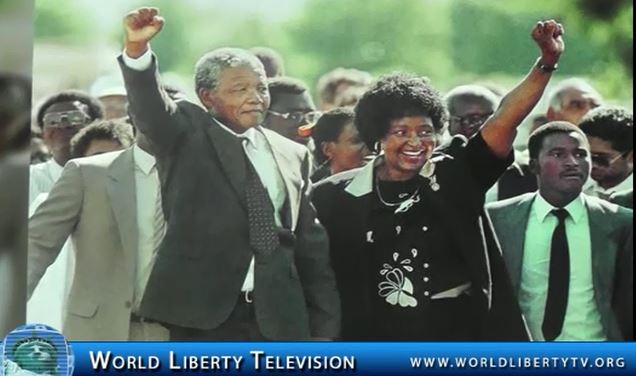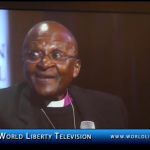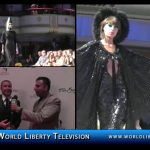In 1989, while in the last months of his imprisonment, he obtained an LLB through the University of South Africa. He graduated in absentia at a ceremony in Cape Town.
Nelson Mandela, while increasingly politically involved from 1942, only joined the African National Congress in 1944 when he helped formed the ANC Youth League.
In 1944 he married Walter Sisulu’s cousin Evelyn Mase, a nurse. They had two sons Madiba Thembekile ‘Thembi’ and Makgatho and two daughters both called Makaziwe, the first of whom died in infancy. They effectively separated in 1955 and divorced in 1958.
Nelson Mandela rose through the ranks of the ANCYL and through its work the ANC adopted in 1949 a more radical mass-based policy, the Programme of Action.
In 1952, he was chosen at the National Volunteer-in-Chief of the Defiance Campaign with Maulvi Cachalia as his Deputy. This campaign of civil disobedience against six unjust laws was a joint programme between the ANC and the South African Indian Congress. He and 19 others were charged under the Suppression of Communism Act for their part in the campaign and sentenced to nine months hard labour suspended for two years.
A two-year diploma in law on top of his BA allowed Nelson Mandela to practice law and in August 1952 he and Oliver Tambo established South Africa’s first black law firm, Mandela and Tambo.
At the end of 1952 he was banned for the first time. As a restricted person he was only able to secretly watch as the Freedom Charter was adopted at Kliptown on June 26, 1955.
Nelson Mandela was arrested in a countrywide police swoop of 156 activists on December 5, 1955, which led to the 1956 Treason Trial. Men and women of all races found themselves in the dock in the marathon trial that only ended when the last 28 accused, including Mr. Mandela were acquitted on March 29, 1961.
On March 21, 1960 police killed 69 unarmed people in a protest at Sharpeville against the pass laws. This led to the country’s first state of emergency on March 31 and the banning of the ANC and the Pan Africanist Congress on 8 April. Nelson Mandela and his colleagues in the Treason Trial were among the thousands detained during the state of emergency.
During the trial on June 14, 1958 Nelson Mandela married a social worker Winnie Madikizela. They had two daughters Zenani and Zindziswa. The couple divorced in 1996.
Days before the end of the Treason Trial Nelson Mandela travelled to Pietermaritzburg to speak at the All-in Africa Conference, which resolved he should write to Prime Minister Verwoerd requesting a non-racial national convention, and to warn that should he not agree there would be a national strike against South Africa becoming a republic. As soon as he and his colleagues were acquitted in the Treason Trial Nelson Mandela went underground and began planning a national strike for March 29, 30 and 31. In the face of a massive mobilization of state security the strike was called off early. In June 1961 he was asked to lead the armed struggle and helped to establish Umkhonto weSizwe (Spear of the Nation).
On January 11, 1962 using the adopted name David Motsamayi, Nelson Mandela left South Africa secretly. He travelled around Africa and visited England to gain support for the armed struggle. He received military training in Morocco and Ethiopia and returned to South Africa in July 1962. He was arrested in a police roadblock outside Howick on August 5, while returning from KwaZulu-Natal where he briefed ANC President Chief Albert Luthuli about his trip.
He was charged with leaving the country illegally and inciting workers to strike. He was convicted and sentenced to five years imprisonment which he began serving in Pretoria Local Prison. On May 27, 1963 he was transferred to Robben Island and returned to Pretoria on June 12. Within a month police raided a secret hide-out in Rivonia used by ANC and Communist Party activists and several of his comrades were arrested.
In October 1963 Nelson Mandela joined nine others on trial for sabotage in what became known as the Rivonia Trial. Facing the death penalty, his words to the court at the end of his famous ‘Speech from the Dock’ on April 20, 1964 became immortalized:
“I have fought against white domination, and I have fought against black domination. I have cherished the ideal of a democratic and free society in which all persons live together in harmony and with equal opportunities. It is an ideal which I hope to live for and to achieve. But if needs be, it is an ideal for which I am prepared to die.”
On June 11, 1964 Nelson Mandela and seven other accused Walter Sisulu, Ahmed Kathrada, Govan Mbeki, Raymond Mhlaba, Denis Goldberg, Elias Motsoaledi and Andrew Mlangeni were convicted and the next day were sentenced to life imprisonment. Denis Goldberg was sent to Pretoria Prison because he was white while the others went to Robben Island.
Nelson Mandela’s mother died in 1968 and his eldest son Thembi in 1969. He was not allowed to attend their funerals.
On March 31, 1982 Nelson Mandela was transferred to Pollsmoor Prison in Cape Town with Sisulu, Mhlaba and Mlangeni. Kathrada joined them in October. When he returned to the prison in November 1985 after prostate surgery Nelson Mandela was held alone. Justice Minister Kobie Coetsee had visited him in hospital. Later Nelson Mandela initiated talks about an ultimate meeting between the apartheid government and the ANC.
In 1988 he was treated for Tuberculosis and was transferred on December 7, 1988 to a house at Victor Verster Prison near Paarl. He was released from its gates on Sunday, February 11, 1990, nine days after the unbanning of the ANC and the PAC and nearly four months after the release of the remaining Rivonia comrades. Throughout his imprisonment, he had rejected at least three conditional offers of release.
Nelson Mandela immersed himself into official talks to end white minority rule and in 1991 was elected ANC President to replace his ailing friend Oliver Tambo. In 1993 he and President FW de Klerk jointly won the Nobel Peace Prize and on April 27, 1994 he voted for the first time in his life.
On May 10, 1994 he was inaugurated South Africa’s first democratically elected President. On his 80th birthday in 1998 he married Graça Machel, his third wife.
True to his promise Nelson Mandela stepped down in 1999 after one term as President. He continued to work with the Nelson Mandela Children’s Fund he set up in 1995 and established the Nelson Mandela Foundation and The Mandela-Rhodes Foundation.
In April 2007 his grandson Mandla Mandela became head of the Mvezo Traditional Council at a ceremony at the Mvezo Great Place.
Nelson Mandela never wavered in his devotion to democracy, equality and learning. Despite terrible provocation, he never answered racism with racism. His life has been an inspiration to all who are oppressed and deprived, to all who are opposed to oppression and deprivation.
Yvonne Chaka Chaka aka Princess of Africa did a live performance, where Nelson Mandela was honored with the South South Awards 2013. In New York, his two daughters Zindzi Mandela and Josina Machel picked up the award on his behalf.













